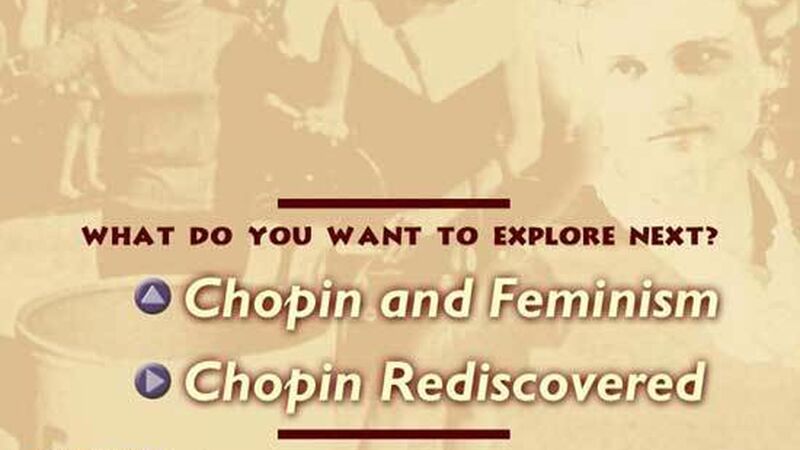Feminism & Rediscovery: Chopin and Feminism

Chopin and Feminism
Transcript
NARRATOR: The Awakening and some of Kate Chopin's short stories got negative reviews largely because of her frankness about sexual awareness and the desires for some female characters to gain independence. The cool reception of Chopin's works caused her to destroy some of her stories such as one called "A Poor Girl" and "Young Doctor Gosse".
SOUNDBITE: David Chopin/Kate's Grandson
Well this was a woman whose personality was different than the writers of her day, and because her personality was different, it came out in her writings, naturally, just how the personality of some other writers would come out, and hers happened to be a personality which as I say was warm and open and loving and accommodating and accepting and ah, strong feelings about things and not afraid to put them into words, and that got her into trouble, but redemption came a half century later.
NARRATOR: That openness appears to be what helped bring back Chopin's works in the 1960s and 70s, during the women's movement. Women rushed out to buy Chopin's works especially the book, The Awakening. But, major Chopin scholars indicate she would have probably frowned at the thought of being part of any movement.
SOUNDBITE: E. F. Genovese/Emory University
She was making a very firm point that the freedom which serious writers are concerned is the freedom of the imagination, the freedom of the soul, of the spirit, the internal freedom. It is not in rearranging society closer to the heart's desires. It's an understanding of the heart's desire in all its permutations.
NARRATOR: Despite Chopin's intents, she definitely had an impact on the women's movement. One of her greatest fans, Chopin biographer, Emily Toth.
SOUNDBITE: Emily TothEmily Toth/Louisiana State University
I can't say The Awakening changed American society, but, I think The Awakening encouraged women like me, who were in grad school at the time and read it, to pursue growth and striving. I was the first grad student in my program ever to, to study women's studies, and it was because of Kate Chopin, so, I think she would be thrilled to know what we're still talking about her, still gossiping about her. I think she'd be honored. I think we're honored that we have her.
NARRATOR: It is also on The Awakening is now included among the top five American novels that are "required reading" for college students in this country. It's also on many reading lists in secondary schools throughout the English speaking world.
Feminism & Rediscovery: Chopin Rediscovered

Chopin Rediscovered
Transcript
NARRATOR: All in all, Kate Chopin wrote more than 100 novels, short stories and poems. These works have had critics and fans. The novel, The Awakening is her masterpiece. It was chiefly lambasted by critics in the late 1890s, but it has been highly praised since the late 1960s.
SOUNDBITE: Emily Toth/Louisiana State University
The very first review The Awakening got was a rave review, a very positive review from a woman, an independent new woman named Lucy Monroe of Chicago. But, that was the last good review. Then The Awakening started being reviewed by men who didn't like it, and a couple of women who were kind of in between about it. Willa Cather was one, but it got savage, really scathing reviews from men who basically denied that women could feel the way Edna did.
NARRATOR: Those reviews contributed to the almost entire disappearance of Chopin's works. That was until a professor at Harvard encouraged a man. Per Seyersted of Norway to read Chopin. Seyersted was enthralled by what he found. The writings reminded him of stories his mother had told him in Norway concerning women's battles for independence.
SOUNDBITE: Emily Toth
He's the one who went around to libraries and magazines, put together all her short stories in two volumes, so that we have, we have her writings because of his willingness to do that, at a time when Xeroxing, photocopying, didn't exist yet. Computers didn't exist. He had to copy things by hand, go to libraries in St. Louis and copy by pencil, short stories, and did it. He was dedicated.
NARRATOR: Among Seyersted's reprints was an article claiming that The Awakening had been banned from libraries. The book was never banned. Worn out copies were simply never replaced in libraries. But, the idea that the book had been banned only helped to convince more people to read The Awakening in the 1960's and 70's as the women's independence movement was well underway.
SOUNDBITE: Emily Toth
I think he really believed it was banned. But he brought back Kate Chopin at a time when we needed her, and through the lens that we needed to see her as an independent voice long before we thought they existed, squelched but still speaking to us hundreds of years later.
NARRATOR: Seyersted presented Chopin's works to the world in the book The Complete Works of Kate Chopin. He also authored Kate Chopin A Critical Biography and a Kate Chopin Miscellany. Now back to Kate Chopin's writing.

